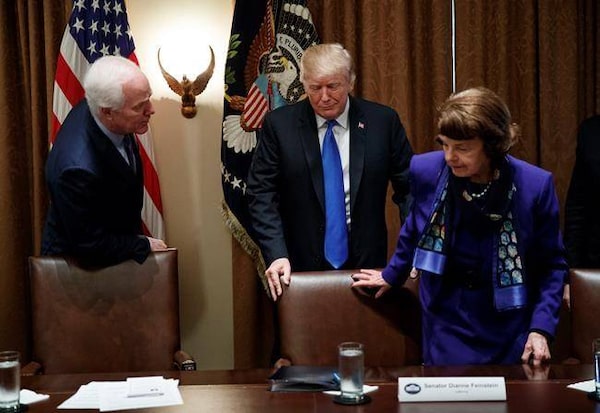
President Donald Trump pulls out a chair for Sen. Dianne Feinstein, D-Calif., right, as Sen. John Cornyn, R-Texas, talks at left, in the Cabinet Room of the White House, in Washington, Wednesday, Feb. 28, 2018, at the start of a meeting with the president and members of congress to discuss school and community safety. (AP Photo/Carolyn Kaster)
In a little over an hour on Wednesday, Donald Trump threw years of Republican dogma on guns out the window.
He pushed for comprehensive background checks for gun purchasers and supported instituting a minimum age to buy a rifle. He torpedoed a measure under consideration to make concealed weapons easier to carry nationwide. And he castigated his fellow Republicans for being "petrified" of the National Rifle Association.
If this were any other president, such statements would represent tectonic political shifts. With Mr. Trump, however, it may be no more than an afternoon's musings.
Mr. Trump made his comments in an unusual televised meeting with a bipartisan group of lawmakers, which was convened to hash out a path forward after a gunman killed 17 people at a high school in Parkland, Fla., earlier this month.
The tone and format of the gathering carried a strong sense of déjà vu: Back in January, Mr. Trump invited legislators from both parties for a similar made-for-television negotiating session on the topic of immigration.
Then, as on Wednesday, Mr. Trump proclaimed his willingness to get something big done and to upset powerful constituencies. And just as he did this week, Mr. Trump exhorted members of Congress to bring him a proposal that he promised to support.
To say the earlier effort ended badly is an understatement. Mr. Trump proceeded to reject a bipartisan compromise on immigration while the White House worked furiously to undermine another deal with support from members in both parties that emerged during a special Senate debate on the topic.
To be sure, Mr. Trump does seem to want Congress to take action in response to the Florida shooting. However, it is not clear what steps he truly supports – and whether he is willing to do the heavy lifting that will be required to enact them.
Meanwhile, public pressure on elected officials and companies remains high: On Wednesday, both Dick's Sporting Goods and Walmart said they would stop selling guns and ammunition to anyone under 21. In a statement, Dick's Sporting Goods directly linked its decision to the activism of the survivors of the Parkland shooting.
During the meeting, Mr. Trump repeatedly expressed mystification that members of Congress had taken no action after prior mass shootings. He described having lunch with the top officials from the NRA on Sunday and telling them, "Fellas, we gotta do something." Mr. Trump continued, "They have great power over you people; they have less power over me."
While appearing to voice support for tighter gun restrictions, Mr. Trump at the same time described "gun-free zones" as "the most dangerous places." He reiterated his contention that arming teachers was part of the solution to stopping school shootings.
Mr. Trump also declared that the legal process was too slow and cumbersome to remove guns from potentially dangerous individuals. "Take the guns first, go through the due process second," he said.
The lawmakers in attendance were both flummoxed and pleased by Mr. Trump's unpredictability. At one point, Mr. Trump seemed to suggest to lawmakers that they consider including a proposal by Dianne Feinstein, a Democratic senator from California, to ban assault weapons.
"Can you do that?" said Mr. Trump.
"If you help," said Ms. Feinstein, smiling and grasping her hands together in a hopeful gesture.
Sitting to Mr. Trump's right was John Cornyn, the second-most senior Republican in the Senate. He wore a look of consternation on his face for much of the meeting as Mr. Trump repeatedly deviated from his party's established positions on guns. After the fact, Mr. Cornyn, who received the highest possible rating from the NRA for his support of gun rights, described the gathering as "surreal" and "fascinating television."
Despite Mr. Trump's exhortations to lawmakers to put together something "beautiful" and "comprehensive," the White House has yet to indicate the specific steps it wants to see implemented. So far, the measure with the greatest likelihood of being enacted is a minor move to improve the background-check system.
Accomplishing more, lawmakers emphasized on Wednesday, will require leadership from the top.
"Mr. President, it's going to have to be you that brings the Republicans to the table on this," said Chris Murphy, a Democratic senator from Connecticut and an outspoken advocate of gun-control measures.
"I like that responsibility," said Mr. Trump.
Richard Durbin, a Democratic senator from Illinois who played a key role in the recent immigration debate, sounded a note of skepticism about Mr. Trump's apparent desire to enact gun restrictions.
"My advice is: Hope for the best," said Mr. Durbin, according to the Wall Street Journal. But "don't be surprised if he changes his mind in 24 hours."